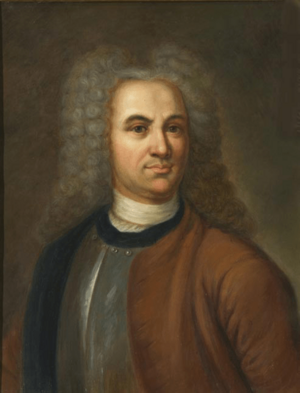Vasily Tatishchev facts for kids
Quick facts for kids
Vasily Tatishchev
|
|
|---|---|
| Василий Татищев | |

Vasily Nikitich Tatishchev, a portrait by an unknown painter, 1800s.
|
|
| Born | 19 April 1686 Boredki, Ostrovsky Uyezd, Pskov Governorate, Russian Empire
|
| Died | 15 July 1750 (aged 64) Boldino, Dmitrovsky Uyezd, Moscow Governorate, Russian Empire
|
| Nationality | Russian |
| Alma mater | Jacob Bruce Moscow Artillery and Engineering School |
| Occupation | historian, geographer, ethnographer, linguist, statesman |
| Known for | Book on Russian history |
| Spouse(s) | Anna Vasilyevna Andreevskaya |
| Children | Eupraksiya Tatishcheva (1715–1769) Eugraf Tatishchev (1717–1781) |
| Parents |
|
| Family | Tatishchev family |
Vasily Nikitich Tatishchev (Russian: Васи́лий Ники́тич Тати́щев; 19 April 1686 – 15 July 1750) was a very important person in the Russian Empire. He was a statesman, a historian, a philosopher, and someone who studied different cultures (an ethnographer).
He is most famous for writing a big book about Russian history called The History of Russia. This book was published after he died in 1767. In his book, he believed that a strong, single ruler (called an autocracy) was the best way to govern Russia. Vasily Tatishchev also founded three important cities in the Russian Empire: Stavropol-on-Volga (now Tolyatti), Yekaterinburg, and Perm.
Sometimes, Tatishchev didn't write down where he got his information from. This made it hard for later historians to check his facts. Some of his stories, like those from a book called the Ioachim Chronicle (which has never been found), are now called "Tatishchev information." Historians usually don't trust this information unless they can find it in other old documents.
Contents
Life of Vasily Tatishchev
Vasily Tatishchev was born near Pskov on April 19, 1686. When he was young, he was taught at home. He learned German and Polish. As an adult, he also tried to learn French and Latin, but he wasn't very good at them.
Early Career and Military Service
After finishing school at the Artillery and Engineering school in Moscow, he joined the army. He fought in the Great Northern War against Sweden from 1700 to 1721. This was a long and important war for Russia.
Vasily Tatishchev worked for Peter the Great, who was the emperor at the time. He got an important job in the Foreign Office, which handled Russia's dealings with other countries. He used his position to disagree with some powerful groups and supported Anna when she became empress in 1730.
Founding Cities in the Urals
Empress Anna gave him an important job managing factories in the Ural Mountains. While working there, he founded the cities of Perm and Yekaterinburg. These cities grew to become very important centers in the Ural region. Today, there is a monument to him in Perm, which was put up in 2003.
He also helped manage military operations during the Bashkir War from 1736 to 1739. He later left this command. Tatishchev finished his official career as a governor of Astrakhan from 1741 to 1744. He passed away at his home near Moscow on July 15, 1750.
Vasily Tatishchev's Work
After he stopped working for the government, Vasily Tatishchev spent his time on studying and writing. He felt that Russian history had not been properly studied.
Historical Writings and Discoveries
He found and published several important old legal documents, like the Russkaya Pravda and the Sudebnik of 1550. His biggest and most important work was the first detailed history of Russia. It was called Russian History Dating Back to the Most Ancient Times. This huge work was published in five volumes after he died. He also created the first dictionary that was like an encyclopedia for the Russian language.
How Historians View His Work
Even in the 1700s, people debated how good Tatishchev's historical work was. Some historians, like August Ludwig von Schlözer, said he wasn't properly trained and didn't know Latin or other modern languages well. However, other historians, like Edward C. Thaden, said this was a bit unfair. Tatishchev did know German and Polish, and his military and government experience gave him special knowledge in those areas.
Another famous Russian historian, Nikolay Karamzin, called some of Tatishchev's claims "inventions" if they didn't have clear sources. It's true that Tatishchev used some old stories that are now lost. But some of these, like the Ioachim Chronicle, might not have been real. Because of this, historians today are careful when they find information only in Tatishchev's writings. They call it "Tatishchev information" and check it very carefully.
Remembering Vasily Tatishchev
Vasily Tatishchev is remembered in many ways across Russia.
Places Named After Him
- Several towns and villages in the Saratov Oblast, Samara Oblast, and Orenburg Oblast are named after Tatishchev.
Monuments in His Honor
- In 1998, a large statue of Tatishchev on a horse was put up in Tolyatti.
- Also in 1998, a monument was built in Yekaterinburg to honor the city's founders, Vasily Tatishchev and Georg Wilhelm de Gennin. It says, "To the glorious sons of Russia V. N. Tatishchev and V. I. de Gennin, Yekaterinburg is thankful, 1998."
Other Ways He is Remembered
- An award named after Tatishchev and de Gennin is given out in Yekaterinburg.
- Mount Tatishchev is the highest point in the area of modern Yekaterinburg.
- In 1985, a special postal envelope was made to honor Tatishchev.
- In 1991, the USSR issued a stamp with Vasily Tatishchev's picture as part of a series on Russian historians.
- A small planet, discovered in 1978, was named after him: (4235) Tatishchev.
See also
- Tatishchev family
 | Janet Taylor Pickett |
 | Synthia Saint James |
 | Howardena Pindell |
 | Faith Ringgold |

